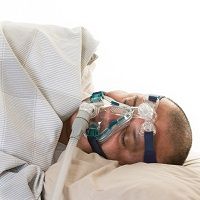Article
Sleep Apnea Risk in Young Veterans with PTSD
Author(s):
Researchers say young veterans with post-traumatic stress disorder (PTSD) are at high risk for sleep apnea.

Young veterans with post-traumatic stress disorder (PTSD) are at high risk for sleep apnea, according to study findings published in the Journal of Clinical Sleep Medicine.
A multifaceted team of researchers examined almost 200 Iraq and Afghanistan veterans presenting to a VA outpatient PTSD clinic for evaluation. The cohort was almost exclusively men and their mean age was 33 years. The participants were evaluated using the Berlin Questionnaire to assess sleep apnea risk. PTSD symptoms were examined using the PTSD Checklist Stressor Specific Version (PCL-S) questionnaire. The investigators also allowed for other factors like slightly older age, smoking status, and use of central nervous system depressants.
The researchers aimed to examine the relationship between self-reported PTSD symptoms and risk of sleep apnea in a younger, Iraq and Afghanistan veteran sample seeking PTSD treatment. Additionally, another aim of the study looked to evaluate the relationships between PTSD and each risk factor of sleep apnea, such as snoring, fatigue, high blood pressure, and body mass index (BMI).
More than two thirds (69.2 percent) of participants were at high risk for sleep apnea — the risk climbed higher with PTSD symptom severity, the researchers found. With each clinically significant increase in PTSD symptom severity, a 40 percent increase in the probability of screening as high risk for sleep apnea was discovered.
“The implication is that veterans who come to PTSD treatment, even younger veterans, should be screened for obstructive sleep apnea so that they have the opportunity to be diagnosed and treated,” co principal investigator Sonya Norman, PhD, researcher at the San Diego VA, director of the PTSD Consultation Program at the National Center for PTSD, and an associate professor of psychiatry at the University of California San Diego School of Medicine, explained in a press release. “This is critical information because sleep apnea is a risk factor for a long list of health problems such as hypertension, cardiovascular disease and diabetes, and psychological problems including depression, worsening PTSD and anxiety.”
Sleep apnea in young veterans with PTSD is often undiagnosed because they typically are not screened for it, the researchers asserted. Why there is an underlying mechanism that links sleep apnea and PTSD in this patient population is still unclear. But the researchers think that factors like disturbed sleep in combat, prolonged sleep deprivation, chronic stresses from PTSD, and sleep disturbances caused by sleep apnea all may affect this relationship. In the future, the authors believe longitudinal studies can examine the temporal relationship between sleep apnea and PTSD.





